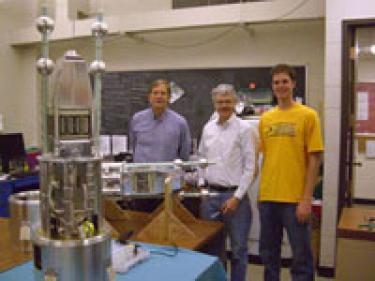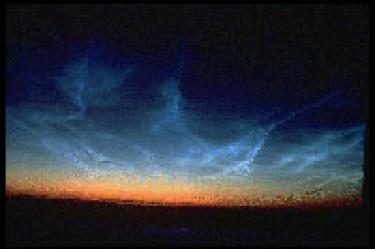Dusty Plasmas
Overview

Rick Kohnert, Scott Robertson, and Scott Knappmiller with the two rocket payloads for noctilucent cloud particles.
Dusty plasma is plasma containing small particles in suspension. In industry, dust is a contaminant and this is a motivation for its removal from semiconductor processing lines, smokestacks, and diesel exhausts. In nature, the ionosphere contains dust from the ablation of meteors, planets have rings of dust that are charged by solar wind particles trapped in their magnetospheres, and objects without magnetospheres (the Moon and Eros, for example) have dusty surfaces that are charged by solar wind particles and by photoelectric emission.
Our research on dusty plasmas has been motivated by these naturally occurring plasmas.
There are five major areas to our research.

Noctilucent cloud in the summer polar mesosphere.
- The largest research project is the development and launch of rocket-borne probes to detect the dust in the mesosphere from meteor ablation and the larger noctilucent cloud particles that form in the arctic summer when ice nucleates and grows on these particles.
- Dust is placed on surfaces in laboratory plasma with UV illumination to find the charge that accumulates. The charge can cause the dust to stick harder to the surface or to be lifted from it. The motivation is to understand the dust hazard that is faced by instruments and astronauts on the moon.
- "Smoky plasma" is generated by evaporating and condensing metal vapor and adding these nanoparticles to plasma. These particles mimic the meteoritic particles in the ionosphere and allow study of charge balance in plasma when there are solid particles.
- Our research makes extensive use of probe methods for plasma and the data are used in developing models for particle and energy balance. The improvement of probe methods and plasma modeling is done in parallel with the dusty plasma research.
- We are developing a mass analyzer (LAMA) for a deep-space probe that will find the elemental composition of impacting interplanetary and interstellar dust. The impacts produce a puff of plasma which is directed into a time-of-flight mass analyzer. The data reveal which elements are present and their isotopic ratios.

